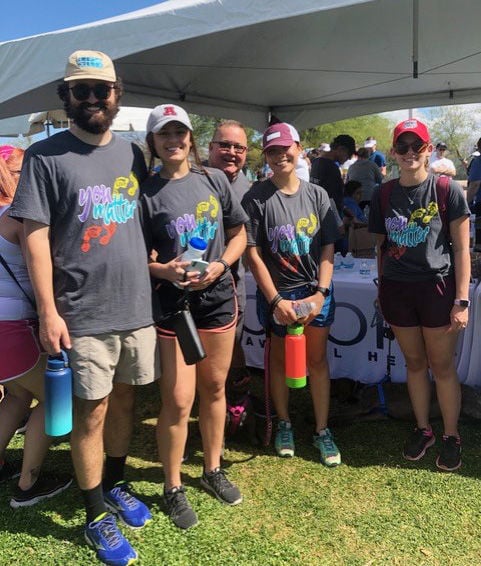While Tucsonans deal with the reality of face masks, social-distancing, reopening of businesses and the uncertainty spawned by COVID-19, one fundraiser offers the opportunity for you to be you, however you are most comfortable.
The NAMIWalks Your Way Southern Arizona: A Virtual Event fundraiser is Saturday, May 30. The day also marks Mental Health for All: A National Day of Hope, in which National Alliance on Mental Illness Walks nationwide will celebrate a day of solidarity and promote awareness about mental health.
Both events could not be more timely, according to Christina Bickelmann, executive director of NAMI of Southern Arizona.
“Early on during the COVID-19 crisis, people hunkered down and we didn’t hear much, but there has been a real uptick in calls, especially in the last few weeks. As time goes on, the anxiety levels have gone up, and not only for those who have previously experienced mental health issues. Everyone is feeling stressed out. From my understanding, suicide rates have gone up and there has been an increase in domestic violence as well,” said Bickelmann.
Since the NAMI office closed to the public March 17, the nonprofit has been working to provide support and education services virtually and telephone advocacy through the office at 622-5582.
“Ending the Silence” classes for middle school and high school students, which are taught by a trained team that includes a young adult living in recovery with a diagnosable mental health condition, are continuing on Zoom.
“We are trying to encourage students, young adults and people of all ages to be aware of the signs and symptoms of mental health conditions and want them to seek help if they are having mental health issues or suicidal ideations,” said Bickelmann.
Signs of some struggling
Possible symptoms of mental health conditions in young people can include changes in school performance, frequent disobedience or aggression, hyperactive behavior, and behaviors such as cutting or eating disorders. Youth and adults alike can also experience changes in mood, behavior, personality or sleeping habits; excessive worry, fear, or anxiety; self-medicating with drugs or alcohol; changes in appetite or weight loss; depression or severe sadness; and difficulty with concentration.
It is particularly important to recognize the current environment can impact mental health and to promote discussions about the topic, said Stephanie Roberts, director of business development at Sonora Behavioral Health in Tucson.
“At the beginning of the pandemic, fewer people were accessing services, possibly due to mandates for social distancing and fear about going into the community. In the last few weeks, we are seeing people reach out for help, many of whom are experiencing increased symptoms of anxiety and depression due to the pandemic,” said Roberts, who is captain of the Sonora Behavioral Health Team for NAMIWalks.
Roberts said it is important for people to be open to talking about their symptoms and ending the silence that often obscures mental illness.
With that goal in mind, the team has chosen “End the Stigma” as the theme for T-shirts it will wear during NAMIWalks virtual event.
“There is so much shame surrounding mental illness and we want to highlight the fact it affects everybody. Even if you personally haven’t experienced mental health concerns, certainly someone you know has,” Roberts said.
Currently, one in five adults and one in six youth ages 6 to 17 nationwide experience a mental health disorder each year and there are early indications that the new reality of COVID-19 is impacting children.
“It seems that children and adolescents are being uniquely affected and it bears some consideration that the closing of schools and the disruption to kids’ academic and social lives has had a tremendous impact on mental health,” Roberts said.
Youth task force
The Help and Hope for YOUth Task Force is making an effort to mitigate that impact on young people ages 10 to 24, particularly in light of the fact the Centers for Disease Control and Prevention cites suicide as the second leading cause of death for that age group.
With support from the Lovell Foundation, the initiative through NAMI of Southern Arizona and the University of Arizona is dedicated to improving youth outcomes by reducing the stigma for those living with and seeking services for mental illness. One goal is to add mental health to the educational curriculum statewide.
Anthony Cicchino, 27, who is a leader of the youth task force, said that during the pandemic the effort has been working to improve outreach amongst peers through one-on-one support and social media. Since the walk became virtual, the group has dedicated itself to a month of social media advocacy on its Instagram — www.instagram.com/helphope4youth/ — that is run completely by youth participants.
“We want the young people to network with their peers. There are many who have maybe never had mental illness but have opened up during this time that they have felt anxiety, depression or post traumatic stress disorder. They are networking amongst themselves: It is great and humbling to see 15-year-olds network with other 15-year-olds,” said Cicchino.
Additionally, Cicchino said emphasizing a “healthy lifestyle” perspective seems to be proving effective for the young people.
“The term ‘stigma’ doesn’t speak to this age group, but ‘healthiness’ does. They say, ‘Healthy mind, happy life,’” said Cicchino.
Ultimately, Cicchino, who has lived with depression and anxiety throughout his life, believes that educating people about mental illness will lead to acceptance and understanding.
“Some people don’t want to hear truth or statistics. They give you the stereotypical advice to ‘Get over it’ and I wanted the platform to say, ’Don’t say that, because you can’t just get over it.’ I want to make adults and youth aware that sharing your story makes you braver. It doesn’t make you brave to keep it in,” said Cicchino.





